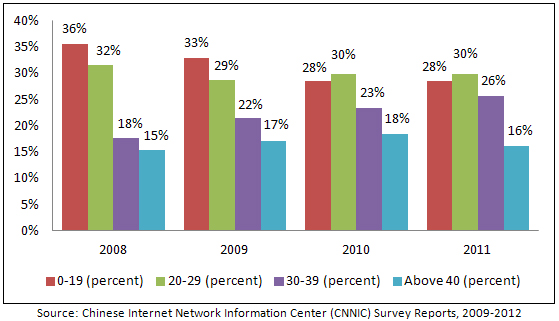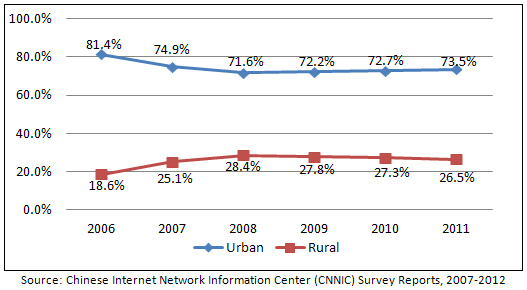Is the Chinese netizenry cosmopolitan, educated, and informed? (Part II)
Leave a commentDecember 21, 2012 by chinawideweb
A few weeks back, I wrote a blog post arguing that the typical depiction of the Chinese netizen as educated, cosmopolitan and well-informed is largely a myth. In that post, I took up the “educated” claim first, noting that in reality, nearly 70% of Chinese Internet users have junior high or high school diplomas; only 12% have degrees at the Bachelor’s level or above and 11% with Associate degrees in 2011. Not only is the Chinese netizenry much less educated as often portrayed, it is no longer a populace dominated by men either (I’ll admit however academic degrees are not perfect proxies for education or intelligence, but unfortunately the best we have right now).
Chinese Internet Users: Young and Urban It is worth to emphasize that the Chinese online population remains quite young and urban: about 60% are under the age of 30 (see Figure 1); the urban-to-rural ratio is roughly 3:1 (see Figure 2). However, such characteristics of the Chinese netizenry do not hold true for the entire Chinese population that is aging and half-urban-half-rural. While 40% of Chinese, or 538 million, use the Internet; 800 million Chinese remain offline at the moment.
Figure 1. Age Distributon of Chinese Netizenry (in %, 2008-2011)
Figure 2. Urban-Rural Distribution of Chinese Netizenry (in %, 2006-2011)
Urban But Not Urbane or Cosmopolitan Being urban is not necessarily the same as being urbane, or cosmopolitan. The former is more of a geographic or physical descriptor (as in “living in the city”); the latter more of an attitudinal or mental one (as in “thinking and behaving in a sophisticated or cosmopolitan way”). Although it may be argued that someone living in the city is more likely to be urbane, urban dwelling is by no means a sufficient condition to qualify someone as “being cosmopolitan.” A cosmopolite is a citizen of the world, someone who has “worldwide rather than limited or provincial scope or bearing,” as the Merriam-Webster dictionary explains. It is in this sense of being free from provincial or national ideas and prejudices that Chao’s assertion in her Foreign Policy article – “for the most part, the Chinese Internet users are cosmopolitan, educated, and informed” – fails.
In actuality, while three out of four Chinese netizens live in the city, only one out of four (a generous estimate) has a degree at the Associate/Bachelor’s level or above. This is not to say that urban dwellers with junior high or high school diplomas (or even primary school diplomas) cannot be urbane or cosmopolitan. Nor do I attempt to suggest that every Bachelor’s degree-holder is by definition a citizen of the world. I’m simply questioning if we have too high an expectation for Chinese netizens or misconstruing this population by painting them as cosmopolitan, educated, and informed.
Informed Netizenry? How Many? Further, what does “informed” really mean? Chao’s article, judged in its context, suggests “informed” means Chinese netizens are NOT left in the dark: they know the Tiananmen Square as a political reference; they are aware of what they’re missing; and many are capable of using such circumvention technologies as the VPN to access blocked content. Just how many? The article didn’t say. And this is precisely where the article falls short. Blanket statements like the above tend to create and propagate more myths than they are supposed to expel.
While it’s impossible to put an accurate figure to “informed Chinese netizens” not least because the meaning of “informed” is open to debate, a bit of probing may be informative here.
Some Chinese netizens could be quite well “informed” by accessing such critical Chinese sources as Southern Metropolis Daily (with a daily circulation of 1.69 million, slightly higher than NYT in 2011) or its online arm Nadu.com (with a daily page view of 20 million). It is important to recognize that while Internet users are more likely to be open-minded and better informed than newspaper-readers or TV-viewers in China, it is ultimately the quality and nature of news and information sources that help shape someone’s knowledge, values and outlook. I’m aware “informed” can be defined in dozens of different ways. Perhaps this deserves another post, another time.
A particularly interesting question to ask in this discussion is: how many Chinese netizens can access the “global Internet” beyond the GFW? I focus specifically on how many: 1) use VPNs; 2) speak English/have studied abroad; and 3) use Facebook or Twitter. Alternative proxies and matrices are certainly welcome.
How Many Chinese Netizens Use VPNs? 3% and Likely Considerably Less. It is entirely possible to access the “global Internet” without a VPN since the GFW only filters the most “sensitive” sites or webpages. It is unclear though how many actually do so. While China Web has grown in user population, content generated, and even in the number of alternative sources of information (from personal websites, to blogs and microblogging), the state still defines the boundaries of public discourse in this expanding “walled garden” or “large atrium.”
It is difficult to argue that one is truly well “informed” without access to the best and most critical content on the World Wide Web, many of them world-class news and information sources (an online filtering test site tracks what’s blocked by the Great Firewall). Sometimes a mainland netizen might be able to browse liberal-leaning overseas/HK news sites published in Chinese directly (e.g. NYT Chinese, FT Chinese, BBC Chinese, Bloomberg Chinese, or even HK’s somewhat neutral Mingapo), unfortunately more often than not these sites are blocked by the GFW too, not to mention the “far left” or extreme Maoist elements of the China Web that are also silenced earlier this year.
Chinese figures of VPN users are unavailable, but this Harvard Berkman Center report (2010) puts the percentage of online circumvention tool users at 3% of China’s online population (roughly 14 million) and states that “[the] actual number is likely considerably less.” With the latest GFW upgrade toward the year’s end, many users in China have found their VPNs useless.
How Many Chinese Can Speak English? Probably 10 Million or Less. How Many Chinese Have Studied Abroad? Roughly 2 Million. Compared to non-English speakers, English-speaking Chinese obviously have an advantage in accessing a broader spectrum of content on the global Internet (the same perhaps true for Chinese who speak other foreign languages). While official Chinese statistics like to boast China’s openness by stating China has about 300 million English learners, and a seasoned China watcher even put the figures of English-speaking Chinese “who have some degree of spoken fluency” at 50-150 million (roughly 4 – 12% of China’s entire population), such numbers are far too generous in my view. One in ten or twenty Chinese can speak English with some degree of fluency? I doubt the veracity of such a claim even in places like Beijing or Shanghai. Given my own experience in China’s higher ed system, not every English major can speak English with a degree of fluency, let alone non-English majors.
An academic paper (2006) published in English Today differentiates English “speakers” from “learners” and lowers the figure of English-speaking Chinese to a much more modest 10 million. I’ve noted in an earlier post that China’s Ministry of Education estimated 116 million Chinese have some college education. That one out of 12 Chinese college grad can speak English with some fluency seems much more plausible. Furthermore, semi-official Chinese publication China Education Online (2011) estimates that 1.9 million Chinese have studied abroad between 1978 and 2010, and among them about 1/3 returned to China.
How Many Mainland Chinese Are On Facebook or Twitter? 600,000 on Facebook & 100,000 on Twitter? A more restrictive test of how “informed” Chinese netizens are is to ask how many of them are actually on Facebook or Twitter. This is not to say that a mainland Chinese on Facebook or Twitter is by definition liberal or dissenting for this is certainly often not the case (think official propagandists on Twitter). It simply is an indication that he/she has the ability to scale the GFW and access a rich reservoir of alternative information if he/she so chooses. Although some Chinese Twitter users played a crucial role in real-time international diplomacy as in the Chen Guangcheng case, their numbers pale in comparison to Sina Weibo’s 400 million users (despite concerns of Weibo bots and artificial inflation of Weibo trending topics).
SocialBakers estimates that about 600,000 mainland Chinese are on Facebook in 2012. This most likely includes native-English speakers residing in China as well. What about Twitter? Precise figures are hard to come by. As Rich Martin pointed out in his TechAsia post in September 2012, Global Web Index’s numbers (63 million Chinese FB users and 35 million Chinese Twitter users) “smelled funny.” In particular, he cites Eric Fisher’s 2011 visualization map of language communities on Twitter, in which mainland China does not seem particularly active or visible. In his 2012 TED talk, Michael Anti estimates that there are probably 100,000 Twitter users from mainland China. Impressionistic, they are. But unless Twitter releases its official data, all we have are approximations.
Chinese Netizenry Mostly Cosmopolitan, Educated, and Informed? Such a depiction is best reserved for a small group of Chinese elites who have the drive, technical skills, and resources to connect to the global Internet. Here, “elites” are determined not so much by wealth or social status, but by computer/network knowledge and an intense curiosity for the outside world. As this blog post has demonstrated, the Chinese netizen population that can and want to access the “global Internet” is probably really small. The majority of Chinese Internet users may not have the tech know-how, possess necessary resources, or even care to scale the ever higher Great Firewalls erected along China’s virtual borders.

